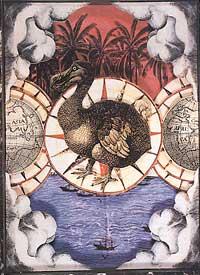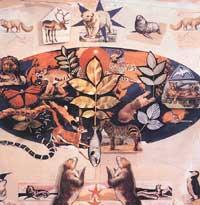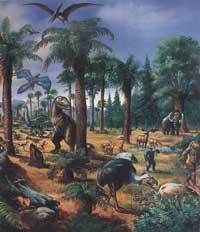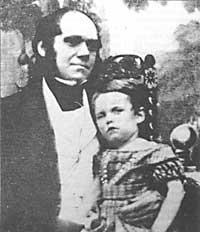Evolutionism
1993/11/01 Bandres Unanue, Luis Iturria: Elhuyar aldizkaria
Introduction
The idea that the development of nature is a consequence of constant evolution is very old, since at least the classical Greeks knew it. According to Heraclitus everything is pouring constantly. According to Enpedokles, the development of life is something that progresses gradually and passes from imperfect beings to other more perfect, calm but constant structures. It seems that the atomists, who consider themselves as the defenders of evolutionism, believed that each species appeared “ex novo”, but accepting that they only remained well adapted to their environment, assimilated the essence of the theory of natural selection, but we can think that the basis was only speculation. “Being true does not allow us to maintain opinions if they are not based on an adequate analysis of actions,” said one thinker. In this area, the Greeks could do no more than they did, that is, raise questions, problems and seek a palpable solution through speculation.

It has actually taken more than two thousand years and with them works of several researchers so that scientists would take seriously the hypothesis about the idea of evolution. Until the publication of the works of Darwin and Wallace, scientists who did not participate in the debate of evolutionism left this subject to philosophers. Moreover, it must be said that the attitude of scientists, even of society, was contrary. The philosophers, for their part, kept this topic open and did not succeed but a few exits that would be working hypotheses for scientists. Therefore, when culture had a new and freer time to see this subject again in Bacon, Descartes, Leibniz, Kant and other philosophers should not surprise us.
Meanwhile, scientists constantly advanced collecting data and gradually entering this line along the path of evolutionism. Some philosophers apparently had similar ideas about species transformation (and experimental research), but most, if not all, considered evolution as a speculative issue. However, we must recognize that philosophy has contributed to the theory of evolution. At that time, scientists and philosophy were often identical.
Herbert Spencer, for example, although a good biologist liked philosophy more and before publishing as a philosopher Darwin’s work “Origin of Species”, completed and promulgated his evolutionary system. But at the same time, the botanist Godron, for example, and despite having collected many data on plant changes, did not accept the idea of evolutionism. Both philosophers and scientists worked correctly. While philosophers debated a philosophical problem that was not mature for scientific research, scientists, acting wisely, wanted to accept as a starting point mere speculation (not even as a hypothesis) without sufficient proof.
However, as we have seen before, the XVIII. and XIX. Throughout the first half of the twentieth century more scientists emerged against current scientific opinion, accepting one or another part of evolutionism. Buffon, for example, intervened between orthodoxy and the ideas of the “chain of beings”, finally proposing the direct influences of the environment in the change of beings. The poet Erasmus Darwin, writing:
“The metamorphoses of animals, as when the head becomes frog...; the changes that artificial growth entails: as in horses, dogs and sheep...; seasonal and environmental variations...; the basic unit that is observed in all warm-blooded animals...; all these signals tell us that they come from a unk and similar.” We see the ideas of Lamarck and Saint-Hilaire, but what influenced Darwin (also Wallace) was Malthus.
Thomas Robert Malthus was born in 1766. After his studies he was appointed Protestant priest of the church of a village in Surrey (England). At that time, the growth of the English population was enormous and at the same time the situation of life was often regrettable. In 1798 he published his “Essay on Population”. In it, recognizing that the human race tends to reproduce constantly, I thought that if that is not kept within a limit it will generate hunger for all. Therefore, if that border was not reached civilized, it would be caused by wars, famines and plagues. In this sense, we must remember that in other publications of his book an adequate birth control was approved and that at that time control came from the hand of the marriage delay.
The very influence this book had on Darwin clearly told us: “In October 1838 with chips and especially seasonal, I read an essay on the population of Malthus. Due to the long observations he constantly made to the habits and plants of animals, he was well equipped to understand the struggle for survival everywhere. That is why he immediately thought that while the most suitable variety underlies under these conditions, the rest will disappear. This would cause the appearance of new species. I had a theory to work with.”
Darwin

Charles Robert Darwin was born in 1809 in Shrewsbury, England. His father was a local doctor and the atmosphere of the house was good economically and even culturally. At first, like his father, he took the road to Edinburgh to become a doctor, but after seeing two operations, at that time they were performed without anesthesia, he decided to abandon those studies. It was then that he began the path of the Church and, with the intention of being a Protestant pastor, began in the classrooms of Christ’s College in Cambridge. There he meets theologian Henslow, who teaches botany classes. He welcomed him and made him awaken his hobby. After obtaining his bachelor's degree in 1831, due to the efforts of Henslow, Darwin had the best chance of his life, a trip on a boat called Beagle.
In that ship he had the opportunity to know the lands and waters of South America. He was fascinated by the prosperity of natural life in those places and felt that all living beings were interrelated. Upon his return home, he collected and analyzed all the material collected, and worked hard to develop his transmutation notebooks. Fifteen months later he read Malthus's work and discovered the key to the theory of means and processes for the development of new species.
Beings of the same race are different because of their congenital characteristics. Darwin accepted it without saying about the cause of inequalities. When in a group of beings the number grows and with it the competition for finding a partner increases, beings with specificities suitable for life or for the struggle to find a partner have an advantage over others and as a consequence the probability of having a longer life and the possibility of having more offspring and better. In addition, these offspring will inherit the peculiarities of their parents. Therefore, the same race will change due to the progressive disappearance of the most inadequate beings, and finally, a more sustainable and consistent variety of the same race.
Taking this idea as a hypothesis, Darwin spent twenty years collecting data and testing. Meanwhile he read a book of machinists: domestic animal husbandry, horticulture, natural history. He carried out experiments crossing the pigeons of the house, studied the transport of the seeds, studied the geographical and geological distribution of plants and animals, that is, put before his eyes everything that had to do with the subject that had in his hands. He formed and ordered the results of the work in depth and expressed a special skill in this field, as well as the meaning of the actions. Darwin was very intelligent in inventing working hypotheses, but he never closed his eyes to facts. Write: “I have always tried to keep all mental freedom and, although I find it very attractive, I have always been willing to reject any hypotheses that do not fit the facts.”
By 1844 Darwin was convinced that species were not invariable and that their origin was natural selection. However, he did not publish his results. But in 1858 he received a work written by Wallace in which the core of his theory appeared. Then Darwin, although invented by the same theory, made himself available to Lyell and Hooker, who decided to present shortly Wallec's report and a letter from Darwin to Asa Gray in 1857 and a summary of his theory in 1844. Darwin began to work and summarized the results of all his research. Thus, in 1859 he published a great book entitled “The Origin of Species”.
At first many people were frightened by this theory. That way of thinking questioned, at least to a large extent, the religious and philosophical ideas of the human race. Today the idea of evolution is totally accepted, so it is difficult to understand the atmosphere of that time. However, we must think that at that time there were very few people able to understand the evidence that was given in favor of theory. These tests required in-depth studies on living beings and fossil remains. Therefore, most had two options: either to deny the consequences of a theory that did not understand what it was based on, or to reject the ideas inherited from the ancestors. The exit is well known.
But the attack on Darwin's ideas did not come only from the younger people. The prestigious anatomist Owen, for example, was totally against and wrote a harsh and harsh criticism. Of course, many of his companions agreed with him. On the contrary, Hooker, Asa Gray, Huxley and Lyell, among others, were quick to show favor to Darwin. From the beginning Huxley led the whole team. He put on the pseudonym “The Darwin Dog” and was willing to divert the arrows that came against Darwin’s book from everywhere. The best known of all Huxley conflicts is that of Bishop Wilberforce. In 1860 he attended the meeting of the British Association of Oxford. The bishop was a very skilled man, among other things in the field of natural sciences and was chosen to defend the position of orthodoxy. Without understanding the real essence of the problem, the bishop tried to break the very idea of evolution. Huxley gave him a profound answer and, more so, reproached him for his ignorance and irreverence in this field.
However, when Huxley, as a good scientist, saw a gap in Darwin's theory, he did not hide it. And considering that the creation of species only appeared through the accumulation of variations, he denounced that next to it was left a point of great importance, that is, that the beings obtained through the crossing between similar but different species are often sterile. The reason for this sterility is difficult to understand if it is considered that we all come from the same trunk. But no one gave importance to this difficulty expressed by Huxley and discarded himself in the belief that it was going to be solved with work and time.
After overcoming the exclamation environment, the biologists of the time accepted Darwin's path and believed that natural selection was sufficient to express evolution. However, this acceptance was not unanimous and shared. The continent's most famous ethnologist, Virchow, did not accept this theory. However, in Germany Darwin's ideas were very successful and not only in nature lovers.
Philosophers and politicians coincided in the creation of what was called “Darwinismus”, in which its members were often more Darwinist than Darwin himself. Along with this, Darwin's ways, that is, observation and experimentation on inheritances and variations, were abandoned from speculative paths. Society recognized natural selection as an adequate and proven cause of the origin and evolution of species. Darwinism somehow lost part of its scientific theory, becoming philosophy (or if you want religion).

From there two paths were opened: on the one hand, that of the naturalists who studied botany and zoology in reality, such as those who were growing new plants and animals in hamlets and orchards, and on the other hand, that of the morphologists of the laboratory. For the first, the species remained fixed and the new varieties did not come by levels and without realizing it, but in bapate, indicating the changes that were seen from the first moment. The latter, on the contrary, acted in their speculations and without consulting others. This situation was corrected in the last decade of the century and the researchers of the laboratories re-investigated the inheritances and varieties. Then they saw that their ideas often did not conform to the facts and in 1900 they found works of Mendel, forgotten, but that we will see in another.
Although Darwin himself acknowledged that the fundamental reason for evolution was natural selection, he did not completely dismiss Lamarck's idea of the inheritance of the particularities obtained through the use or not of organs. But the evidence he had at that time was not enough to give way to the problem. At the end of the century the scientist August Weismann took another step in this field. This implied a distinction between body or some and germ cells. Somal cells only produce cells of their species, but germ cells do not generate only cells of their species. They also create the rest of the body.
Therefore, being a mixture of the body of being, the true genealogical trunk comes directly from the germinal plasma. When Weismann published his conclusions he was very surprised. Biologists were accustomed to maintaining the law of using organs or not to answer the settlement questions. On the other hand, evolutionary philosophers, especially Spencer, recognized that the heritage of the peculiarities obtained throughout life was the key to the development of race. For their part, educators and politicians based this theory on the progress of society. However, and while biologists were accepting new ideas, others have so far remained steadfast with their own prejudices. But not to inherit the specificities obtained throughout life means that nature is more than a nurse and that inheritance is more than the environment.

Gai honi buruzko eduki gehiago
Elhuyarrek garatutako teknologia





